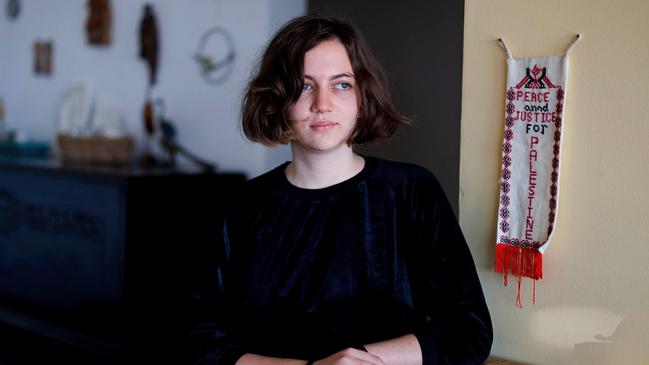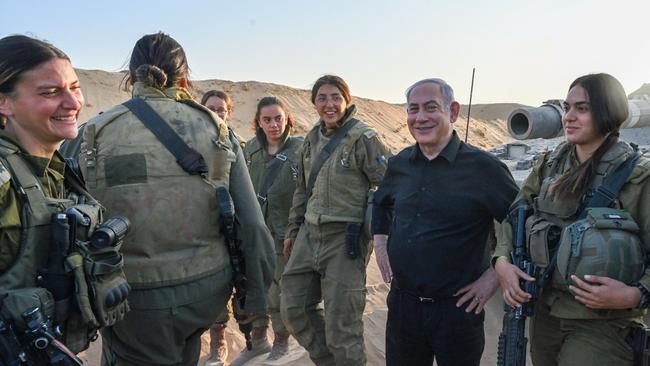The life of Israel’s refuseniks: prison, death threats and lost friends
Sofia Orr is likely to become the first woman since the start of the Gaza conflict to be jailed for refusing military service.

In her eighth-floor flat in northern Israel, Sofia Orr is filling an army-issue rucksack with underwear and a book.
Unlike those packed by thousands of teenagers who have joined the Israel Defence Forces since October 7, however, the bag she is filling in the town of Pardes Hanna-Karkur is for prison.
Orr is likely to become the first woman since the start of the Gaza conflict to be jailed for refusing military service because of her political beliefs.
After speaking publicly about being a conscientious objector, Orr, 18, has received death and rape threats. On social media she was called a “self-hating Jew” and a traitor. Friends have called her naive and ungrateful.
Her mother, Sigul, has spent three years trying to persuade her to change her mind, but Orr remains undeterred.
“I have never thought I was going to enlist, even when I was really young,” she said. “There’s that feeling you want to serve your country and protect your country, but I thought there were other ways to help people around me. I think it is wrong to take children and make them into soldiers and not leave them any choice in it.”
Orr is part of a tiny minority. Compulsory military service has long been a cornerstone of Israeli society, as most of her friends accept. Many of their contemporaries have felt a stronger compulsion to fight since the attack by Hamas on October 7 in which at least 1200 Israelis were killed and about 240 people kidnapped, most from the Gaza border kibbutzes. Of these, 130 hostages are unaccounted for.

More than half of Israelis believe that continuing the military offensive in Gaza is the best way to recover the hostages, according to polling by the Israel Democracy Institute published in January. Within two weeks of October 7, an unprecedented 2000 ultra-Orthodox Israelis, who are excused military service on religions grounds, chose to enlist.
The network that supports Orr, Mesarvot (We Refuse), has 400 members. Many are active on the Israeli left, which has little representation in the Knesset.
A former classmate of Orr, who grew up a few kilometres from her and asked to remain anonymous, started her military service soon after October 7.
“In Israel, everyone goes to the army, it’s the thing you do,” said the classmate, whose work in an intelligence unit helps to prevent cyberattacks. In addition to her compulsory two years of service, she has signed up for four more years in the army, but is torn between her feelings about the conflict and her career. Israelis who serve are often awarded higher salaries than those who do not, she said.
“I know people who have just finished service who are getting a boosted pay grade because they have been in the army,” she said. But she too has reservations about Israel’s military operation, in which almost 30,000 Palestinians have been killed, according to health officials in Gaza’s Hamas-run administration. The UN said the majority were women and children. Israel claims that more than a third were Hamas fighters.
“Horrible things happened to people in my country but horrible things happen also in Gaza and I feel sorry for everyone,” the classmate said.
“It was easier for me to go into the army doing this job. I don’t know if I want to believe it or if it’s true, but I think the work I’m doing doesn’t do any harm, it protects our soldiers.”
Tests of Israelis’ mental and physical fitness to serve start at age 16. The call-up comes two years later. Both men and women are required to complete military service – two years and eight months for men, two for women – though the army has asked soldiers to serve an extended period because of the war. Refusing on political grounds is illegal.
Most 18-year-olds who avoid enlistment do so by securing an exemption or deferral, usually on medical or religious grounds.
Enlistees are called to Tel Hashomer base in Ramat Gan, Tel Aviv. Those who refuse face a disciplinary hearing and are often sent to jail. The cycle continues until the army’s enlistment unit, Meitav, declares the citizen unfit to serve, at which point they are exempted.
The number of conscientious objectors imprisoned in Israel each year is unknown. The average sentence for refuseniks during wartime is between 90 and 120 days, according to Mesarvot.
In the two months after October 7, 60 per cent of men and 40 per cent of women who received the draft enlisted, according to the Israeli news website Walla News. Of the 144,000 18-year-olds eligible for service in 2020, 47 per cent joined up. The IDF does not routinely publish full demographic data on enlistment or exemptions.
Mesarvot founder Noa Levy refused service in 2002 during the second intifada and supports members in her capacity as a lawyer. She said declining a call-up was hard, not least because of the social isolation young Israelis will face.
“There is no information at all about conscientious objection,” said Levy, who is vice- president of the left-wing Hadash party.
“There is a conscience committee but nothing public about how to get to it or about other ways of being released from the army. These are big question marks for 18-year-old kids, they’re very young, called in front of a system that is huge and very strong.”
In Britain, there were almost 60,000 conscientious objectors during World War II, including many Quakers. In Australia there were almost 2800 during WWII and about 1000 during the Vietnam War.
Since Russia’s invasion of Ukraine, hundreds of Russian refuseniks have faced criminal charges, while Ukrainians of fighting age have fled their country.
Orr does not believe joining the army will solve the conflict.
“My decision became political when I was 14, when I started to ask myself, ‘If I go and serve almost two years in the army, who and what do I actually serve?’ I would go and serve an endless cycle of bloodshed, and that is not something I wanted to do,” she says.
In December, Tal Mitnick, the first teenager to be jailed for refusing service since October 7, was sentenced to an initial 30 days. On Sunday he attended the enlistment centre for the third time, having served 60 days over two sentences.
Back in Pardes Hanna-Karkur, Orr does not believe in the “horrible consequences” the army suggests a prison sentence will have on her life and career.
“One thing that pushes me to do this, even when I’m scared, is knowing that I will love myself more if I stand by my values and my strong belief in peace” she says.
The Sunday Times



To join the conversation, please log in. Don't have an account? Register
Join the conversation, you are commenting as Logout